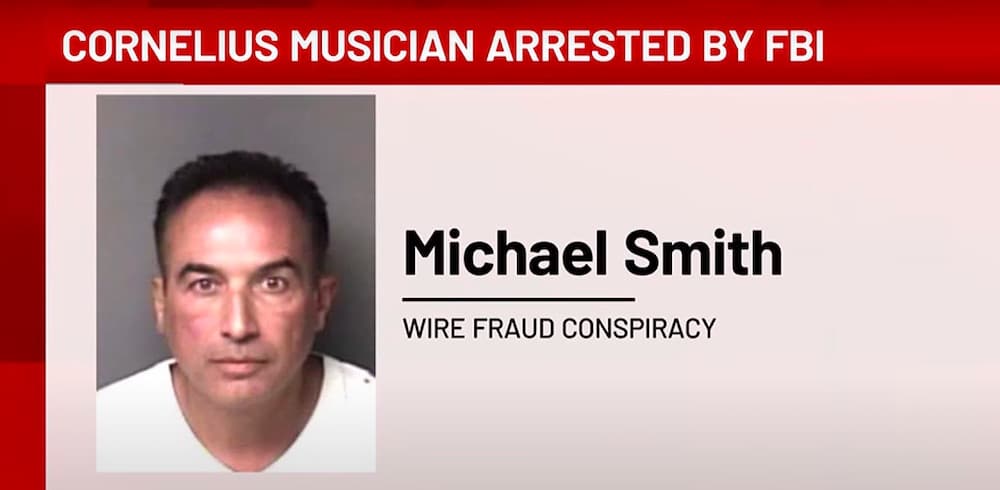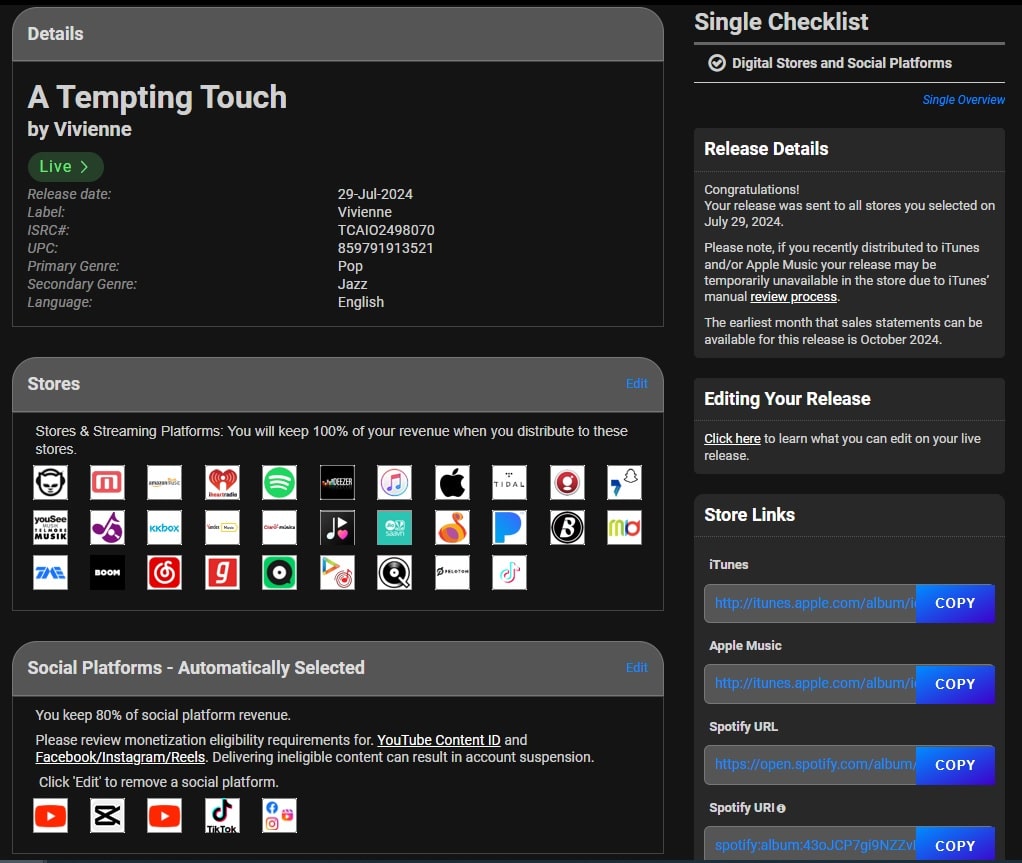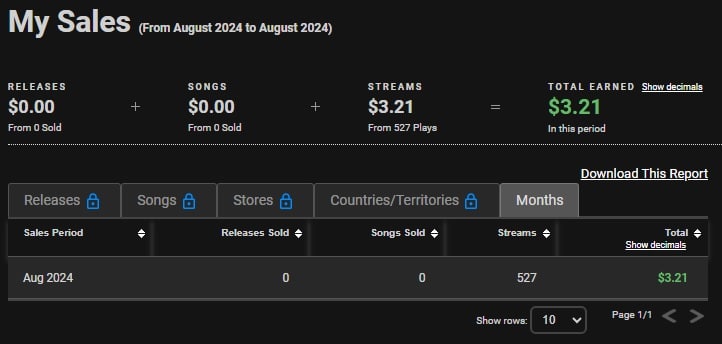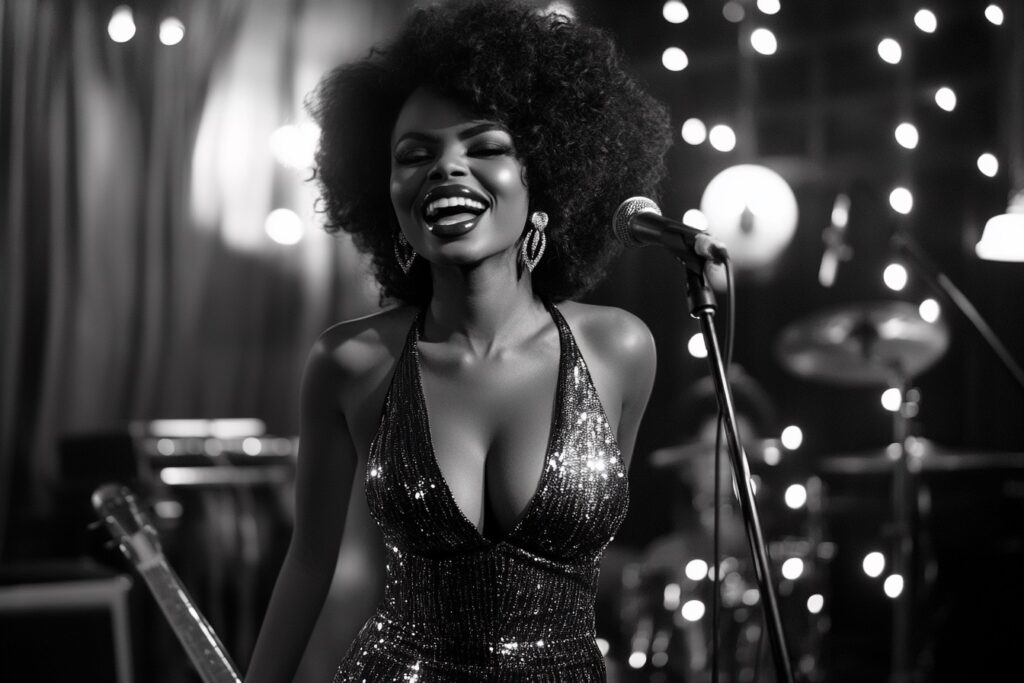Of course, you secretly hope that you accidentally generate a hit that gets picked up and lets you pay off your mortgage in one go. But how? You want to publish your music on all the well-known streaming platforms, but it’s not that simple. At least, it’s not something you can do without the help of a publisher. When you start searching online for this, you’ll come across many providers. Some of them charge you a relatively small periodic fee, often yearly. Others claim that they can get your music onto streaming platforms for free, but there are usually some small catches when you read the fine print. Often, it’s about a percentage of royalties being withheld or a limit on the number of tracks you can upload within a certain period. But there’s something else: personally, I’m always a bit suspicious of anything that’s ‘free’. After all, someone has to be working for me, right? Does more money stick to their fingers than I realize? How is this middleman getting paid? No, I’m skeptical when something is ‘free’.
Spotify and AI
Moreover, are platforms like Spotify and Apple, let’s just stick to the biggest ones for now, even waiting for AI-generated content? I couldn’t find much on this, except that Spotify isn’t fundamentally opposed to individuals uploading AI-generated content. On their website for content creators, Spotify mentions that they want to provide as broad a platform as possible to give creatives space to express themselves. That sounds promising.
Especially when you consider the huge debacle where a scammer used AI to defraud Spotify out of a few million dollars. It should be noted, however, that it’s not so much the use of AI that is illegal, but rather the use of bots to generate millions of streams for personal gain.

In my first blog, I noted that choosing the name ‘Vivienne’ wasn’t the smartest move. And indeed, that’s true. It turns out there are dozens, possibly even hundreds of artists named Vivienne. Initially, my song ended up under the ‘wrong’ artist on both Spotify and Apple. Artists have their own dedicated pages on streaming services
It took me several weeks and a lot of emails and support tickets to get this issue sorted out. I must say that Spotify’s helpdesk responds much faster than Apple’s, where even receiving an acknowledgment of my message took a day in my case.
TuneCore Music Distribution
Anyway, back to the beginning: you need a publisher that can ensure your music gets on all major streaming platforms (including YouTube and TikTok, etc.) and that royalties are paid to you.
I didn’t go with a free distributor, but with the same one that ‘John de Koning’ from ‘Zo Zomer’ used. Apparently, this is a proven path that works, so why reinvent the wheel? This distributor is called TuneCore. The membership costs 25 euros per year, and you can upload an unlimited number of tracks.

I decided to go ahead with them, and I have to say, the process was very smooth and clear. The web interface is user-friendly, and it’s easy to see what you need to do and what the status is. In fact, it basically comes down to uploading the music file in WAV format along with the artwork. During the upload, certain checks are performed, and then the waiting begins. It took a few days before I received confirmation that the track was approved and sent to the streaming platforms. However, I also received the disclaimer that not every platform integrates the track at the same speed. I have the impression that the entire process can take around 3 to 4 weeks.
Who is getting the credits?
However, I did send a message in advance stating that I wanted to upload an AI-generated track. I received a polite response saying that it wasn’t 100% guaranteed it would be published if it was fully (100%) AI-generated. I noted that the lyrics were largely written by me. They then responded that it would be best to include the website where I generated the track (Udio) in the credits to provide transparency.
I decided to follow the rules and keep my word by listing Udio as the composer. According to Udio’s general terms, this isn’t strictly necessary, but I don’t want to give the impression that I made the track entirely myself, so I have no problem being fully transparent about it.
It can take a few weeks for your track to appear on all streaming platforms, as some have their own review processes. Apple is one such example.

Once your track is available in the stores, you can also edit your artist page. I haven’t tried this with all streaming platforms, only with Apple and Spotify, and Spotify by far offers the most options for an artist. You can write a short biography, upload photos, and even add short videos to support your music. There are also paid plugins available that, for example, allow you to display the lyrics in karaoke style. But as long as releasing music has only cost me money so far, I’m leaving this for now.
My Sales in a month – 527 streams
With that, we come to the end of this series: ‘How to Create Your Own Artist and Get on Spotify?’ After about a month, the total royalties received stood at a meager $3.21, which, given the number of streams—over 500— actually isn’t too bad. And no, I haven’t been playing the track on Spotify non-stop myself. In fact, after uploading it and listening to it countless times during edits, combined with having a vacation coming up, I pretty much ignored it altogether.

And is it done now?
No, definitely not. At the moment, I’m spending my evenings creating a music video to go with the track. For this, I’m using completely different tools, which I will definitely cover in a follow-up to this blog. For now, I’ll leave it here and wrap up with a couple of short teasers for the upcoming music video!
Final thoughts:
During the process and also while talking to others, I often wondered whether making music tracks using AI is essentially cheating. You skip several steps, taking three at a time, and get results within minutes. There are no costs for musicians, studios, etc. Oh, let’s be honest: my track isn’t ‘hit material’—far from it. But it’s definitely not terrible either! There is much worse out there. Even among the more than 300 CDs I bought mainly in the 90s from world-famous artists who struggled to put more than two good tracks on an album, with the rest just being ‘fillers’—exceptions aside. But let there be no doubt; I have great respect for real musicians and artists who have written monumental songs, and for bands playing in small venues, full of passion.
I am not a musician or an artist. In a way, there is an aspect of ‘unfair competition’ here. It’s entirely possible that real big hits could be made using AI. But then again, we can’t be 100% sure that it hasn’t happened already. Who can guarantee that today’s famous artists aren’t using AI—perhaps pressured by their labels to ‘produce’ quickly? It could also help smaller artists and bands get demo material out faster, inspire them. I hold onto the thought that, ultimately, it will lead to more creativity, making music production accessible to more people who now find it impossible. Furthermore, I strongly believe in the self-regulating nature of the industry. Sure, there will be an incredible amount of AI-generated junk. But I suspect that it will also quickly fade into the background. What is good will last. And honestly, I don’t care if AI had a hand in that.
